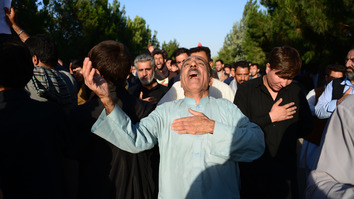HERAT -- About 2,000 Shia Muslims in western Afghanistan staged a protest on January 3 against the "Islamic State of Iraq and the Levant" (ISIL), as the government warned that the group had expanded its foothold into 11 provinces, AFP reported.
Chanting "Death to the enemies of Afghanistan!" and "Death to ISIL!", protesters in the city of Herat marched on the governor's office, carrying pictures of Shia Muslims killed in recent attacks.
"ISIL attacks on our mosques are increasing everyday," said Qurban Ali, a 40-year-old demonstrator. "They want to create a rift between Shias and Sunnis."
"This is a dangerous trend, and we want the government to protect us," he said.
ISIL attempting to foment sectarian divide
The rise of ISIL has raised the spectre of sectarian discord in Afghanistan, something that the Sunni-majority country has largely been spared despite decades of war.
Until a few months ago, ISIL was largely confined to Nangarhar Province, bordering Pakistan, where it is notorious for brutality including beheadings.
But the government this week said the group was steadily expanding into other provinces.
"Our initial information shows Daesh is behind the recent attacks in Herat," Najeebullah Mani, head of counter-terrorism at the Interior Ministry, told reporters in Herat. "They are expanding and are always looking for new geographical areas."
"They are present in at least 11 [of Afghanistan's 34 provinces]," he said. "Their main goal is to create sectarian divisions between Shias and Sunnis."
Herat, which borders Iran, has recently witnessed a surge in attacks on the minority group's mosques.
A prayer leader was killed and five others wounded in one such attack on January 1. ISIL did not claim responsibility.
"We will not allow ISIL to make Afghanistan another Syria," said 30-year-old Jawad, another protester. "The government must come up with a plan to protect Shias."
Last year, Afghanistan witnessed a wave of attacks on Shias claimed by ISIL, which considers Shia Muslims apostates.
At least 14 were killed in October in a powerful blast at a Shia mosque in the northern city of Mazar-e-Sharif, hours after gunmen targeted Shia worshippers in a shrine in Kabul, killing 18 people.
In July, ISIL militants targeted members of Kabul's Shia community in a suicide bombing that killed more than 80 people and wounded 130.
'We will be one nation forever'
Abdulraoof Ahmadi, spokesman for Herat Province police, said police are working with the Afghan National Defence and Security Forces to ensure the safety of the people and to bring stability and peace to the country.
"We are working together with forces and people against ISIL and other militants in Herat," he told Salaam Times. "They are on the back foot now, and we will clear the area as soon as possible."
Police and security forces are taking measures to prevent ISIL and other insurgents from attacking mosques in the future, he said, without elaborating on the specifics of the security plan.
"We are working with community elders and scholars to let the people know who are the real protectors of the people and who are the enemies of their life," he said.
"ISIL is killing our scholars and attacking our mosques, and it wants to create differences between us," Mahdi Hadid, head of the security committee of Herat Province, told Salaam Times. "We are one nation, and ISIL can't divide us into Sunni and Shia. We will be one nation forever."
Mulvi Ahmad Akhoondzada, spokesman for the Sunni Ulema Council of Herat, said the council strongly condemns attacks on Shia and Sunni mosques, calling them "inhuman" acts committed by ISIL.
The Sunni Ulema Council considers those who commit terrorist attacks on holy places to be enemies of Islam, he told reporters December 24.
[Izazullah from Kabul contributed to this report.]

![About 2,000 Shia Muslims in western Afghanistan staged a protest on January 3 against growing sectarian attacks by the 'Islamic State of Iraq and the Levant' (ISIL), as the government warned that the group had expanded its foothold into 11 provinces. [AREF KARIMI/AFP]](/cnmi_st/images/2017/01/04/6955-000_jk2et-585_329.jpg)







Greetings. Look, Shiites interfered in Syria and there they were arrested. They have gone there from here and Iran sent them. What you are publishing in this area is kind of propagation, you should not do so. ISIS is dangerous not only for Shiites but also for the whole world; however, Salaam Times has mentioned only Shiites. Shiites themselves go to Syria and there they participate in the fighting. There, they were arrested by Syrian army, but you are covering it. You have to publish reports to show that ISIS is dangerous for the entire world. ISIS does not differentiate whether one is Shiite or Sunni. They are killing the humans. They are enemies of humanity. I strongly refuse that it is dangerous only for Shiites. ISIS has killed common people. They are not looking for some particular group. They killed a 7 days' old child in Afghanistan. He was not a Shiite. Your propagation has negative effects on the people and not positive. You should mention the whole world instead of only Shiites. Thanks and sincerely, your permanent reader and fan.
Reply2 Comment
Shias have to ask themselves why they were interfering in Syria. They supported the politics of Iran's satanic regime, they became the tool for Iran's interference in Syria, they went there and waged wars in favor of Bashar al-Assad's regime. A few days before, I read on a website that, currently one thousand Afghan shias are fighting in Syria. When one is fighting against someone else and fighting for the interests of others, their loved ones and friends would certainly get targeted by their rivals. Taliban, ISIS and other armed groups are not representative groups of Muslims, in fact that they have been created by great powers to keep their interests by using them. Islam and Muslims' name has been defame in it for no reason. ISIS's barbarism has no relation to Islam and Muslims.
Reply2 Comment